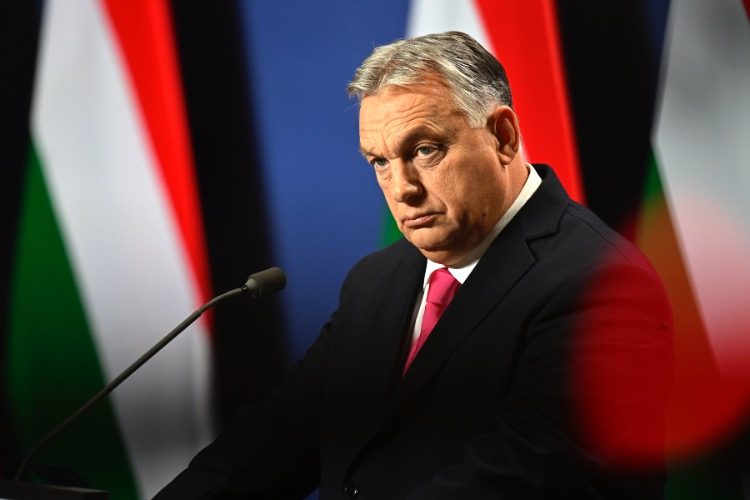
Legislators from Hungary’s ruling party, Fidesz, have declined attendance at a meeting initiated by left-wing and liberal opposition parties to force a vote on accepting Sweden into NATO.
However, parliament lacked the minimum number of MPs for the vote regarding Sweden’s application to join NATO to be valid, maintaining that the Nordic state’s leader must meet with Prime Minister Viktor Orbán before they decide on the issue.
In a statement issued on Monday, Fidesz said that the ratification vote should take place during a regular parliamentary session, but elaborated, “We are expecting the Swedish prime minister to visit Hungary first.”
“If this is an important issue for the Swedes, the Swedish prime minister will obviously come to Budapest,” Fidesz added.
Swedish Prime Minister Ulf Kristersson has voiced his willingness to make the trip, but said he would only do so after his country’s NATO application was authorized, leaving it unclear how Fidesz lawmakers would proceed.
During a meeting with NATO chief Jens Stoltenberg last month, Orbán said he would urge the party to vote on ratification “at the first possible opportunity” — words the U.S. embassy in Budapest quoted later on February 5, saying the day’s emergency parliament session would have provided him that opportunity.
Opposition lawmaker Ágnes Vadai lambasted Orbán for pushing back the vote owing to his “personal vanity,” telling AFP he was hoping to “make headlines in the international press while making a gesture to Russian President Vladimir Putin by undermining the unity of NATO and the EU.”
Though Hungary has denounced Russia’s military action in Ukraine — the latter which prompted NATO applications from both Sweden and Finland — it has refused to follow other EU states in sanctioning Moscow or supplying arms to Kyiv. Following months of political disputes, the parliament in Budapest voted for Finnish accession last March, but has delayed a decision on Stockholm’s bid for months.
Orbán has repeatedly urged for a ceasefire in Ukraine and for peace talks between Moscow and Kyiv, maintaining that Ukraine cannot hope to defeat Russia on the battlefield. His stance, as well as Budapest’s objection to sanctions on Russia and its blocking of EU military aid to Ukraine, has led Brussels to threaten Budapest with counter-sanctions.
“The West still thinks that time is on our side. Yet, I think the opposite is true. I think that time is on the side of the Russians, and the longer the war goes on, the more people will die, and the balance of power will not change in Ukraine’s favor,” Orbán told a local radio station last week.
In January, Orbán tweeted that he backs Sweden’s accession, and invited his Swedish counterpart Kristersson to Budapest to discuss bilateral matters, writing in his letter that “the basis of any political or security agreement between Sweden and Hungary must be mutual strong trust.”
Hungarian Foreign Minister Péter Szijjártó said that it would be “fair” if Kristersson visited Budapest before the ratification, just as the Swedish leader had also gone to Türkiye before the Turkish ratification.
The Hungarian National Assembly will have another chance for a ratification vote when it reconvenes on February 26, though it remains unclear whether Fidesz members will give their assent.
While Finland’s NATO accession went relatively smoothly, Türkiye and Hungary delayed a vote on Sweden. Ankara demanded, among other things, anti-terrorist legislation from Stockholm, while Budapest has been riled by lectures from high-ranking Swedish politicians criticizing its stances on pro-life and gender ideologies.
Meanwhile, the U.S. State Department’s deputy spokesman Vedant Patel told reporters the United States is disappointed that Fidesz blocked an opportunity for a vote on Sweden’s NATO bid. A group of U.S. lawmakers last week called on Orbán to immediately ratify Sweden’s bid, saying patience with Hungary is “wearing thin” as it continues to postpone its approval.
U.S. Ambassador to Hungary David Pressman, along with ambassadors from other NATO allies including Poland, Denmark, and Slovakia, attended the Hungarian parliament on February 5 in an attempt to pressure Budapest to approve Sweden’s bid to join the military bloc.
Sweden’s NATO accession is an issue that directly affects U.S. national security and also the security of the alliance as a whole, Pressman claimed after leaving parliament.
“The Prime Minister pledged to convene parliament, to urge parliament to act at its earliest opportunity, today was an opportunity to do that,” Pressman said.
“We look forward to watching this closely, and to Hungary acting expeditiously.”
In an interview published in late January in the Financial Times (FT), Pressman warned that the United States has the ability to pressure Hungary if it refuses to amend its foreign policy toward the EU, NATO, and Russia, listing out various complaints about Orbán, including the latter’s stance on the Russia-Ukraine conflict and attitude toward Russian President Vladimir Putin.
“When you look at Hungary’s foreign policy, whether it be suggesting raising questions about Ukraine’s EU accession, stymying efforts to provide financial support to Ukraine, meeting with Vladimir Putin, resisting efforts to diversify off of Russian energy, resisting sustained efforts to close Kremlin platforms inside of Hungary, all of these have something in common,” the American diplomat said. “And it’s something that is leaving Hungary more isolated from its partners within NATO and its partners within the EU.”
Pressman went on to assert that Orbán’s “policy choices, without question, are helpful to Putin,” adding that the United States has the power to pressure Hungary.
“We absolutely have leverage, that is true. And we’re prepared to use our leverage.”
Orbán indicated to news outlets La Repubblica and La Stampa that his party Fidesz could join the political group of the European Conservatives and Reformists (ECR) in the European Parliament in the early morning hours of Thursday, February 1.
Both the European Conservatives and Reformists (ECR) and Identity and Democracy (ID) are expected to grow significantly in the European Parliament. ID is already poised to surpass ECR and become the third-largest group in the European parliament. If the two groups combined, the hypothetical ECR-ID merger would place conservatives in a leading position in Brussels.
For its part, Budapest has maintained that no foreign pressure can prompt it to ditch its national interests. “No one can tell us from the outside how to lead our lives within our own borders. Whether it is a foreign citizen, or even a foreign ambassador, their opinion is irrelevant for us,” Hungary’s Szijjártó said last year, as cited by local media.


